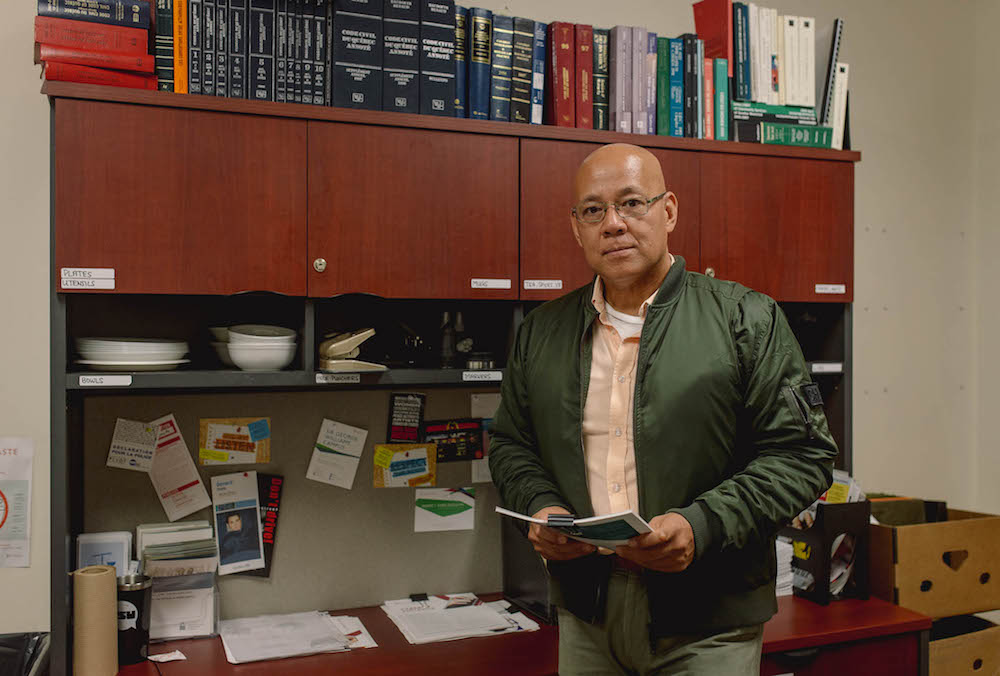Quebec Human Rights Commission to look into alleged harassment
A complaint filed by the Centre for Research-Action on Race Relations (CRARR) on behalf of former Graduate Student Association (GSA) president Alex Ocheoha against the association and three of its directors will be investigated by the Quebec Human Rights and Youth Rights Commission, according to Fo Niemi, CRARR’s executive director.
In a press release, Niemi wrote that the GSA and the three directors “engaged in verbal and other acts of discrimination, harassment and intimidation.”
Ocheoha, who is of Nigerian descent, was president of the GSA from June 2015 to May 2016. He first filed a complaint against the association and its directors in November 2016. “They were addressing me in a disrespectful manner, they were shouting at me, they were trying to cause trouble at the meetings,” Ocheoha told The Concordian at the time about the directors’ behaviour.
“Discrimination and harassment at the GSA is systemic,” Ocheoha stated in a recent email. “There is a pervasive culture of harassment, and there is no system in place to deal with it.” Specifically, the former GSA president referred to the fact the association does not have an advocacy centre like the Concordia Student Union does for protecting students’ rights.
Ocheoha said the directors frequently found ways to prevent him from fulfilling his presidential mandate, and that their email communications felt like racial and cyber harassment. According to Niemi’s press release, the problems “included frequent attempts to impeach him and deprive him of his executive salaries [sic].”
The council of directors—composed of 20 directors—is the second-highest governing and decision-making body of the GSA. According to the association’s bylaws, the directors should “endeavour to improve the general condition of the GSA and of graduate students at Concordia University.”
Emails obtained by The Concordian in November 2016 show that GSA directors responded to their former president’s complaints of harassment with emails that were shared with everyone in the organization. On Oct. 29, 2016, for example, Ocheoha received a response to an email from then-GSA director Rahul Kumar on which the whole GSA organization had been Cc’d. In the email, Kumar wrote: “What do you want to prove from this, Alex? That you are full of shit?”
When contacted by The Concordian to comment on the Quebec Human Rights and Youth Rights Commission investigation, Kumar wrote: “I am sorry I can’t comment on the legal matters, sorry.”
When Ocheoha pointed out that the Cc’d email was an example of ongoing harassment, another former director, Mathilde Ngo Mbom, responded: “Aaaaw the grown-up man feels harassed! Take your balls out of the pockets, put them where (i.e: between your legs) they should be and stop being a cry baby.” She also wrote: “The next time you show some sense of mental disorder, I’ll send these emails to the police, and they will request that you meet a psychiatrist (by force) because you need one.”
Niemi wrote in the press release that the emails and the organization’s “apparent failure to prevent and remedy the situation over a long period created a toxic culture of contempt within the GSA during Ocheoha’s tenure.”
“I get extremely upset each time I recall the very hurtful experience I had during my time as president,” Ocheoha wrote in a recent email. The former president claimed the council was aware of the harrassment and tolerated it. “They all saw the email, and nobody did anything about it. The perpetrators came up with false allegations to justify their harassment,” Ocheoha told The Concordian.
CRARR is seeking $15,000 in moral and punitive damages against the GSA “for failing to take reasonable steps to prevent and stop the harassment and abuse directed at Ocheoha,” according to the press release. CRARR is also seeking an additional $12,000 to $15,000 in damages from each of the three directors, and “systemic remedies that include a zero-tolerance policy against discrimination and harassment involving prohibited grounds such as race, age, disability.” The organization also wants to mandate civil rights training for GSA executives and directors for three consecutive years.
According to Niemi, Ocheoha was willing to settle the case in mediation, but the GSA declined the option. The Concordian reached out to current GSA president Srinivas Bathini as well as vice-president internal Mohammad Taufiquzzaman, but neither responded in time for publication.
In an internal monthly report to the GSA council in October 2017, Taufiquzzaman wrote that one of his highlights as vice-president internal over the course of the month was “looking after the GSA house and the staff members.” His future plan, he wrote, is “maintaining a healthy environment within the GSA house and its student body.”
“It was very insensitive that people appointed by council to a legal committee, which they created to deal with my complaints, were people who were harassing me,” Ocheoha said. “The GSA is supposed to fight for students’ rights, and not use students’ money to oppress other students.”
Photo by Kirubel Mehari
